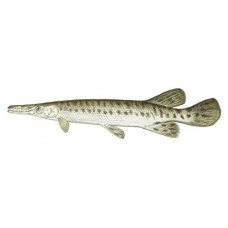Latin name
Lepisosteus oculatus
Other names
French: garpique tachetée; Spanish: gaspar pintado.
Identification
The body of the spotted gar is long and cylindrical, covered with hard ganoid (rhomboid) scales. Each jaw has a single row of teeth. Spotted and Florida gar are the only two species that have spots on the top of the head, as well as on the entire body and fins. The spots in the other gar are limited to the fins and back of the body, usually after the pelvic (ventral) fins. The two species are usually distinguished by the distance between the front of the eye and the posterior edge of the gill cover. If the distance is less than two-thirds of the snout length, it is a Florida gar; if more than two-thirds of the snout length, it is a spotted gar.
Distribution
Spotted gar are found from the Great Lakes to the Gulf of Mexico and down the Mississippi River drainage. It is found along the entire Gulf Coast from central Texas to western Florida. In the northern part of its range, it occurs as far east as the northern and southern shores of Lake Erie in northern Ohio, Michigan, and Ontario, but is rarely found west of Illinois.
Habitat
Spotted gar are common in pools and dams of streams and small and large rivers, as well as in swamps, lakes, and oxbows, often near vegetation. It sometimes enters brackish water and tolerates warm, stagnant water well.
Size
Spotted gar rarely exceed 3 feet and average 21⁄2 feet. The world record for all-tackle fishing is a 9-pound, 12-ounce fish caught in Texas in 1994.
Life history and Behavior
Like other gar, this species is often seen basking on the surface on warm days, resembling a floating log. Occasionally it will float to the surface and swallow air from its specialized bladder. Spawning occurs in spring in grassy marshes.
Food and feeding habits
No information
Reproduction
No information
| Classification | |
| Phylum | Chordata |
| Class | Actinopterygii |
| Squad | Lepisosteiformes |
| Family | Lepisosteidae |
| Genus | Lepisosteus |
| Species | L. oculatus |
| Features | |
| Conservation status | Least Concern |
| Habitat | Pelagic |
| Life span, years | 18 |
| Maximum body weight, kg | 2.7 |
| Maximum length, cm | 91 |
| Sailing speed, m/s | No information |
| Threat to people | Poisonous |
| Way of eating | Predator |



